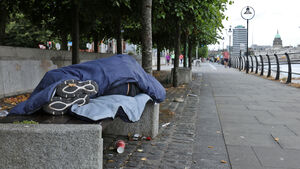Building a just society for the 21st century

A homeless man in his sleeping bag on a bench at City Quay, Dublin last month. Picture: Colin Keegan/ Collins Dublin
The primary task for the next government is to design, build and administer the necessary structures whereby the equitable, just and even distribution of the wealth of the nation is guaranteed. It is a task for the next government because, quite clearly, the present government is incapable of doing the job. If it had the capacity to do the job, one presumes it would have commenced to bring about a more equitable society. It has not done so.
Whereas poverty, as defined by the conditions of starving populations in Third World countries or as defined by AIDS-afflicted peoples throughout sub-Saharan Africa or as defined by inadequate or non-existent educational opportunities for many millions of people everywhere, does not now exist in this country, there remains a huge injustice and inequity in relation to how wealth is distributed.
It is a disturbing reality that the present administration - over eight years of unprecedented economic growth - has failed to bridge the gap between the rich and the poor. We are, in the main, a well-off people but there remains a huge disparity between the wealthy, the well-off middle class and the poor.
The fact of the matter is that the gap has widened leading to an unhealthy situation where a number of super-wealthy individuals and blue chip companies control, not just the wealth, but the means to wealth, of the country as a whole. It is a fact that vested interest groups, big business, the drinks industry, ruthless tycoons, billionaires in exile and multinational corporations have dictated to the government in relation to how the country should be run, what objectives it should set and what taxes should be available for the operation of essential, yet basic, services.
Over the past 30 years, the trade union movement has colluded in this. It has gone along with the easy option of collective bargaining, an option that was in the national interest and in the interest of many workers, but was clearly not in the interests of the weaker sections in society. The outcome has been that the gap between rich and poor has widened at a time when the money was available to genuinely do something about reversing the trend.
It is extraordinary to think that we now have a health service on the verge of collapse and in which discrimination as between rich and poor, between those with health insurance and those without, has become embedded.
It is extraordinary to think that we have a children’s hospital under construction for eight years and progress towards completion is held up as the contractors BAM and the overseers the National Paediatric Hospital Development Board (NPHDB) fight like playground children over details that should be sorted out by a person from either side, using their common sense, rather than their academic qualifications. Squabbling children usually sort out their differences without bringing the Dáil’s watchdogs into action (not really a helpful initiative!) to act as referee. BAM and the NPHDB should be directed to cut out the squabbling, behave like adults and sort out the details. The children who will use the hospital deserve that much.
It is extraordinary to think that the produce of our education system - our young talented people on whom we heap so much praise as the architects, engineers and driving force behind our recent economic success story - have been starved of support in an education system that is creaking with inadequacy because of lack of investment. Where do today’s third-level students get accommodation at a reasonable cost?
The education system that underpinned the nation’s reputation for producing a well-educated, ambitious, adaptable and progressive workforce which helped to attract the foreign direct investment that has generated so many high-earning jobs is creaking at the joints for lack of investment. Our top universities have lost ground and reputation against their peers in other countries, often countries which would struggle to match Ireland’s economic success. There is one good education story and that is the funding and development of the technological universities. At the opposite end of the scale is the lack of places for children with special needs. We are seriously failing the most vulnerable in society.
Don’t get me wrong. There is much that is good in the country and for which the Government can take credit. When we compare with so-called Third World countries we, as a nation, are comfortably off. Even when we compare with our EU colleagues we have much to be proud of.
There has been progress in the development of our road network. The road from Mayo to Galway, Limerick and Cork is a sound piece of infrastructure. We now have a good road from Dublin to Westport. Indeed it is good as far as Newport but beyond that and on to Achill and Belmullet it borders on a Third World road. Much done, more to do.
There has been considerable improvement in local transport with the incorporation of local transport operators competing with Bus Éireann and ensuring more frequent buses on all routes. Local Link has been a boon to rural dwellers in particular.
We are, of course, greatly lacking in this county an adequate rail service. Connecting Sligo to the south of the country should be a number one priority for Iarnród Éireann but that company simply can’t seem to take its eyes off Dublin. Ballina/Westport services to Dublin are Third World too. More Apple money would help.
The need for balanced regional development seems to have evaded the brains trust that runs the rail services. Our public representatives, and by that I mean our TDs and Senators, have failed to get Government to recognise the dire need for investment in rail services to the county. They have not provided sufficient support for the West on Track campaign to re-open the Sligo/ Limerick line. It is past time to get a move on.
And our most serious failure has been the lack of foresight and planning that has resulted in the homeless crisis. Progress has been and continues to be made in providing homes for the least well-off in society but it reflects no credit on the Government that there are close to 15,000 people who have no place they can call home. This includes single adults and, more seriously, almost 2,100 families with over 4,400 children in emergency accommodation.
The Government continues to turn a blind eye to the banks and mortgage lenders who, without impunity, continue to screw mortgage holders and make it impossible for new aspiring house purchasers to secure funding. The banks are making immoral profits at the present time. They have forgotten who bailed them out 15 years ago. Just to remind them it was the Irish taxpayer, and the Government has failed to extract a proportionate return to the taxpayer. The banks have a role to play in making Ireland a more just society. You can be sure they won’t do it voluntarily. They will have to be persuaded and the Government need to get the big stick out and apply it to the fats cats of the banking world. Will it happen? I would not hold my breath.
I like the poor, that’s why I keep ye all poor - Eamon de Valera (according to Bob!)





